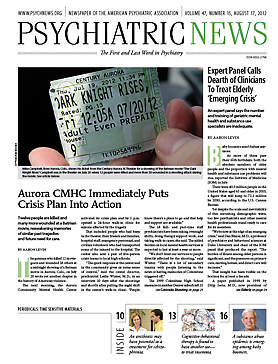A quick, accurate, and easy-to-use test to screen for traumatic brain injury (TBI) would be extraordinarily useful on the battlefield and in civilian emergency rooms.
U.S. Army Col. Dallas Hack, M.D., M.P.H., and colleagues think they may be on the right track to find such a biomarker.
“None of the existing approved tests is a truly objective measure of mild brain injury,” said Hack, in an interview with Psychiatric News. “They all rely on some level of interpretation and clinical information.”
By comparison, cardiologists looking for evidence of a heart attack can measure levels of troponin, an enzyme released by damaged heart cells, said J. Marc Simard, M.D., Ph.D., a professor of neurosurgery, pathology, and physiology at the University of Maryland School of Medicine in Baltimore.
“We’ve been looking for decades for similar biochemical markers to evaluate patients after stroke or TBI, with only disappointing correlations with patient outcomes or severity,” Simard told Psychiatric News. Simard is not involved with Hack’s research.
U.S. forces now use the Military Acute Concussion Evaluation (MACE) to screen for TBI in the field. The test assesses memory, recall, and concentration, and includes basic neurological checks of pupillary response, verbal fluency, and motor coordination. The results of a MACE screening help decide if troops need further evaluation and treatment.
Biomarkers could quantify that status and speed screening, diagnosis, and treatment, said Hack.
Historically, specialists in neurotrauma thought that the blood-brain barrier made it impossible to find anything in the bloodstream that would show evidence of brain damage, he said.
That idea had begun to fade when Hack and researchers from the University of Florida and Walter Reed Army Institute of Research decided on a joint program to look for diagnostic proteins in the blood—in a meeting that took place on the morning of September 11, 2001.
Now, Hack is testing two proteins: ubiquitin carboxyl-terminal esterase L1 (UCHL1) and glial fibrillary acidic protein (GFAP). Both are products released when brain cells are damaged.
UCHL1 is upregulated when neurons are injured, spiking in the blood between one hour and two days after injury, said Simard. GFAP appears about three or four hours and up to four or five days after astrocytes are damaged.
“They are unique enough to brain injury that we know real damage has occurred,” said Hack. Phase 1 and 2 trials indicate that the two proteins have a combined increased sensitivity and specificity when measured at the same time.
In collaboration with Banyan Biomarkers of Alachua, Fla., Hack and colleagues are waiting for approval from the Food and Drug Administration to proceed with a large phase 3 clinical trial of 2,000 people (mostly civilians), some with brain injuries, some with other injuries, and a control group with no injuries.
“If successful, this will fundamentally change the approach to brain injury,” said Hack.
There may be some caveats, though, said Simard. Damage to the prefrontal cortex may not show up immediately. And while a blood biomarker may have the advantage of simplicity, it will likely be less accurate than tests of cerebrospinal fluid, although the latter are impractical in the field.
A successful clinical trial of UCHL1 and GFAP won’t be the end of the line for Hack and his colleagues. Finding other biomarkers to chart treatment and recovery, or manage chronic patients, is the next step.
“What makes a real difference is if we can do something about TBI,” he said.

